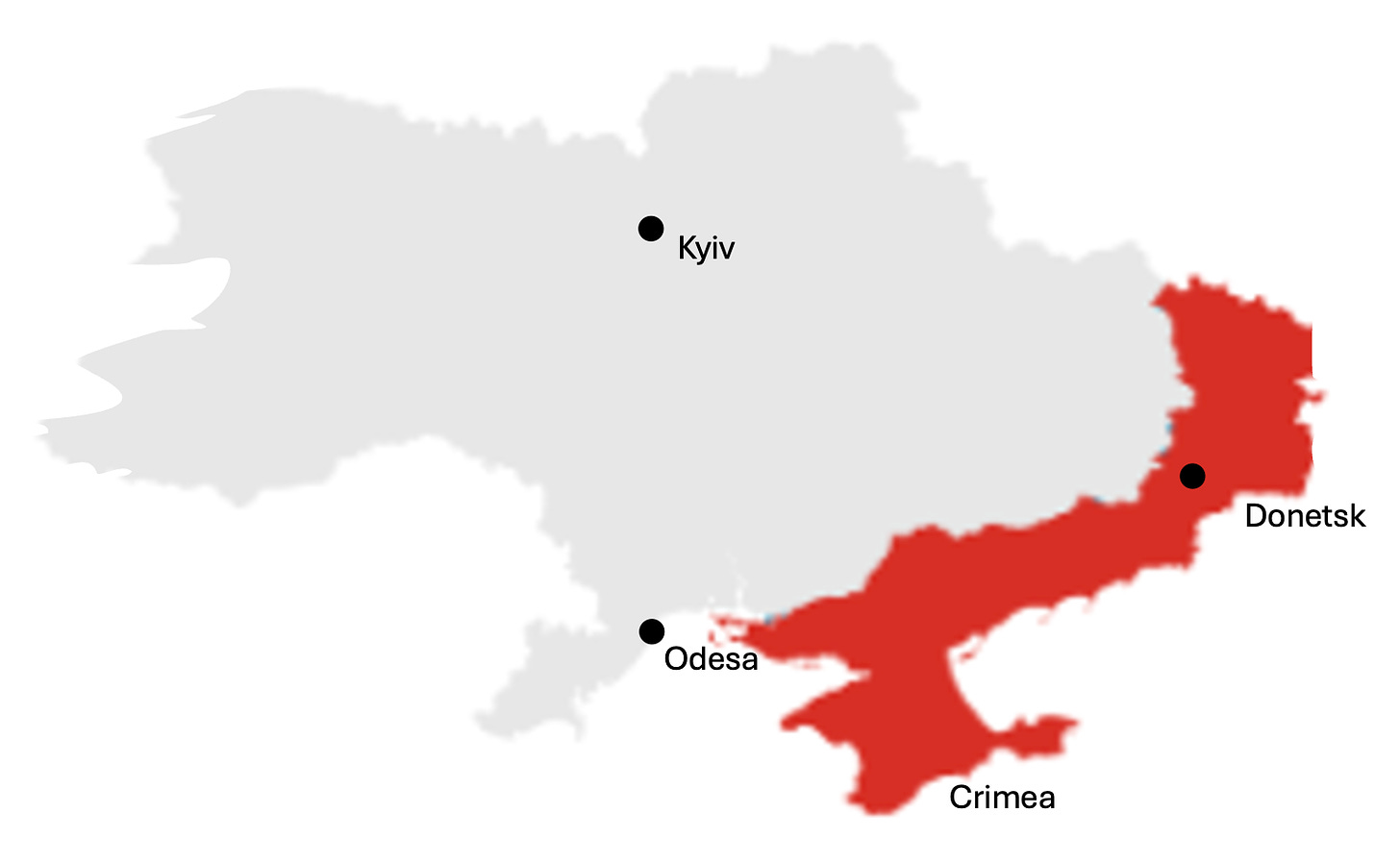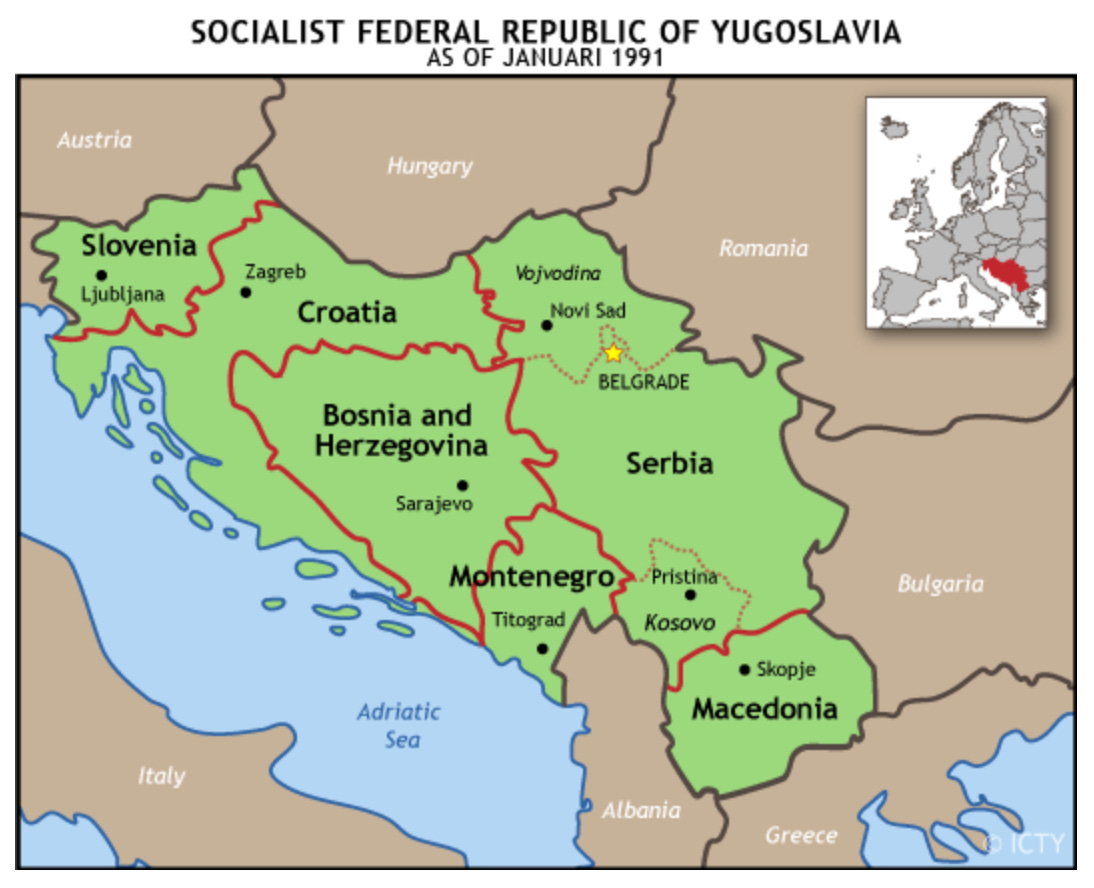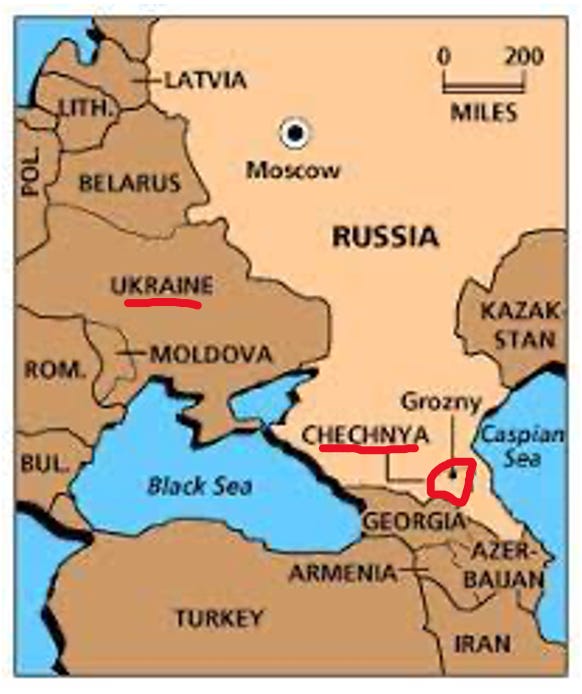By Matt Bivens, Substack, 4/22/24
A year into the invasion of Ukraine, an arrest warrant was issued for Vladimir Putin. The crime: Kidnapping!
Prosecutors with the International Criminal Court accused the Russian president, under cover of war, of having stolen “hundreds” of Ukrainian children. Government officials in Ukraine went further and spoke of more than 16,000 (!) stolen children. Still others spoke of hundreds of thousands, and suggested this could meet criteria as a form of “genocide.”
“The charges carry a potential life sentence,” The Wall Street Journal reported, adding helpfully, “the ICC doesn’t impose the death penalty.” (A contributing author of that Wall Street Journal report, Evan Gershkovich, would himself be arrested two weeks later by Russian security services, and charged with espionage.)
The New York Times reported that Ukraine’s children had been treated as “the spoils of war,” and other headlines were more lurid. “Moscow grabs Ukrainian kids and makes them Russians,” reported Associated Press (where I used to work). “Russia snatches Ukrainian children,” said The Moscow Times (which I used to edit). “Russian ‘child snatcher’ admits taking 700,000 children,” shrieked Britain’s The Telegraph.
This was all a little confusing. Had “hundreds” been kidnapped? Or 16,000, or 700,000? One was hesitant to ask; even a single stolen child would be a terrible wrong.
Then again, the basic facts of an alleged serious crime ought to matter. Especially if we’re going to talk loosely about throwing the Russian president into a UN-run dungeon, even as we complain that they won’t let us just blindfold and shoot him.
Thank you for reading The 100 Days. This post is public so feel free to share it.
Yet in March 2023 the basic facts were scarce, and they remain so today. The ICC says the details are classified: “The warrants are secret in order to protect victims and witnesses and also to safeguard the investigation.”
More context and information was provided by human rights NGOs and journalists. The American media in particular offered detailed anecdotes of family separations, which well illustrated the horror and chaos of war. And yet, in most of these anecdotal accounts, the Russians ended up reuniting Ukrainian families separated in the war zone. (If, out of a spirit of skeptical contradiction, you want to ask: “Don’t you mean, ‘in the war zone Putin created’?” — fair enough, agreed!)
We’ll return to the specific kidnapping allegations. But this is Part III of a history that focuses on the war’s potential to spin out of control, and scorch lands far beyond poor Ukraine’s. In that regard, March 2023 was an exciting new spin of the revolver cylinder in our ongoing game of world-wide Russian Roulette. An arrest warrant had been issued personally for Vladimir Putin — over a viscerally emotive and disgusting accusation. He’s stealing children.
U.S. President Joe Biden, asked his reaction to the ICC arrest warrant, approved. “Well, I think it’s justified,” he said. “I think it makes a very strong point.”
This was the same Joe Biden who in the first year of the war (see Part I and Part II) had only gingerly offered small arms, ammunition and shoulder-fired missiles, for fear of — his words — “Armageddon.” (Yes, that is the President referencing the Bible’s predicted battle that ends all life on Earth.) Biden back then had famously warned Democrats in Congress that “the idea that we’re gonna send in offensive equipment, and have planes and tanks and trains going in … don’t kid yourself — no matter what y’all say — that’s called World War Three. Okay?”
His White House had frantically shushed its own security officials after they’d anonymously bragged to the media about how we’d helped to assassinate at least 12 Russian generals, and to sink Russia’s Black Sea flagship. When Russia’s undersea Nord Stream 2 gas pipeline had exploded — months after Biden had warned, “If Russia invades” Ukraine, “there will be no longer a Nord Stream 2” because “we will bring an end to it” — his White House had shrugged with nervous “who, me?” innocence. Soon after, the White House had pulled aside The New York Times to underline that we not only disapproved of and had nothing to do with a Ukrainian-planted car bomb in Moscow that had killed a Russian journalist — we also really had no idea what the Ukrainians might do next:
“American officials have been frustrated with Ukraine’s lack of transparency about its military and covert plans, especially on Russian soil,” The New York Times reported then. “While the Pentagon and spy agencies have shared sensitive battlefield intelligence with the Ukrainians, helping them zero in on Russian command posts, supply lines and other key targets, the Ukrainians have not always told American officials what they plan to do. … [S]ome American officials believe it is crucial to curb what they see as dangerous adventurism, particularly political assassinations.”
True, Washington was also filled with talk of how we were supporting the coming glorious Ukrainian counteroffensive. (Delusional talk? Cynical talk?) But Biden was still refusing to share F-16 fighter jets or long-range missiles, and had recently told a group of his political fundraiser friends, “We’re trying to figure out: What is Putin’s off-ramp?”
“Where does [Putin] find a way out? Where does he find himself in a position that he does not — not only lose face, but lose significant power within Russia?”
Great question! In reporting it, The New York Times also paraphrased an anonymous European diplomat who said that “when the history of this era is written, many will be shocked” at how frantically officials were working behind the scenes to prevent a nuclear war. The Times said that national security elites were keeping quiet about how much danger of that we were all in “for fear of inducing public panic or market sell-offs.” (!).
Biden’s Armageddon / off-ramp remarks were spun at the time as another Uncle Joe campfire story, just the President making things up again on the fly.
Last month, however, The New York Times — citing 18 months of interviews with top U.S. insiders “who recounted the depth of their fear (my emphasis)” in the fall of 2022 — revealed that in fact the President was sharing our exact intelligence assessments: If Ukraine ever did somehow “start winning,” then Russia really would use battlefield nuclear weapons. Or as Biden told his richest friends (but not us): “It’s part of Russian doctrine … [I]f the Motherland is threatened, they’ll use whatever force they need, including nuclear weapons.”
In that light, how did the looming Ukrainian counteroffensive even make sense? The Ukrainians would be vaporized by battlefield nukes if they started to succeed — the Russians would risk a world war, even a nuclear war, before they’d accept being pushed out of Donetsk or Crimea. In other words, thousands of young Ukrainians would accomplish nothing while dying — and the only question was whether their useless deaths would be brought about by nuclear weapons, or conventional.

We were nevertheless hellbent on proceeding with this counteroffensive — we had rejected direct peace overtures to Washington from the Russians, we had scuttled successful bilateral Russian-Ukrainian peace talks, and we were instead egging the Ukrainians on, demanding that they hurry up and attack already — apparently because we were confident they could not definitively succeed; and thus were reasonably confident they would not cause a wider nuclear war. (See Part II). So … what was the point? Our exact goals were murky: Keep the fight going, so as not to admit defeat before the U.S. presidential election? Fatten our defense contractors? “Weaken Russia?” Whatever one’s goal, it would be sought at the price of tens of thousands of young Ukrainian and Russian lives.
For that matter, where’s the logic in talking about how Putin needs an off-ramp, a way to save face — even as we cheerfully applaud a plan to arrest him for child theft?
Let the evil Slav die in chains
The American political class gleefully celebrated the ICC arrest warrant. It was a chance to fantasize about Putin being clapped into handcuffs — for example, if he were to visit Europe. A CNN commentary crowed that “Putin’s world just got a lot smaller,” and recalled with satisfaction how former Yugoslav President Slobodan Milošević had spent years in a jail cell — in fact, had died in that cell, in 2006, reportedly from heart failure — while his long-running UN war crimes trial crept slowly onward.
The example of Milošević’s arrest, imprisonment and trial is crucial context. Once you consider that startling history, it becomes clear what issuing a similar arrest order for Putin meant: It was a giant stride forward towards a wrecked world. In fact, the ICC arrest warrant was the greatest escalation of the Ukraine war to date — certainly greater than, say, providing 31 Abrams tanks to a war zone flooded with thousands of tanks (see Part II).
Milošević was the only other sitting world leader in history before Putin to face a UN arrest warrant. He was also a fellow Slav who had defied the West, been targeted by NATO, and ultimately been forcibly dragged, by NATO, out of his capital city to die abroad years later in a UN detention center.
When Yugoslavia disintegrated in the early 1990s, its separate republics — Slovenia, Croatia, Bosnia-Herzegovina, Montenegro, Serbia and Macedonia — became independent states, and then started fighting over borders. Serbia, the largest, formed a “new Yugoslavia” with Montenegro, and often the wars involved Milošević’s Serbia claiming to be defending “Yugoslavia.” A decade of waxing and waning violence killed more than 100,000 people, in events oft-lamented at the time as “the worst war in Europe since World War II.” (Today, the far-briefer Ukraine war has already claimed that sad title. So far, more than 200,000 people in Ukraine — soldiers and civilians — have been killed.)

The last major Yugoslav war, in 1998, involved an independence bid by the Serbian region of Kosovo — an ethnically Albanian and predominantly Muslim region inside an Orthodox Christian, Slavic country. It was put down harshly by Milošević. His Yugoslav (Serbian) forces drove hundreds of thousands of civilians from the province. NATO demanded he desist, and in 1999 launched a 78-day aerial bombardment of Serbia. Milošević backed down, Kosovo was put under UN administration, and displaced Albanian civilians returned home — at which point 100,000 ethnic Serbian civilians in Kosovo, fearing reprisals, then fled their homes.
The UN authorized a peacekeeping force, and it’s worth remembering how Russian soldiers (on orders from a younger Vladimir Putin) worked side-by-side in Kosovo with NATO soldiers:

Even so, ordinary Russians had been furious about that 78-day NATO bombardment. The U.S. bombs destroyed military targets — but also killed hundreds of Serbian civilians, and also destroyed power plants, water treatment facilities, factories, bridges and the state-run Serbian radio and television station. (We also bombed the Chinese embassy, which was officially an accident). I lived in Moscow then, as editor of The Moscow Times, and the rage of the street protesters outside the U.S. Embassy was eye-opening. Not that the Russians enjoyed much moral high ground: For years, they had been busily pulverizing their own Kosovo-like enclave of independence-minded Muslims: Chechnya. Perhaps 160,000 people were eventually killed in the Chechen wars. Today, Kosovo is an independent nation (even Serbia recognizes that); but Chechnya remains a Russian province, and the legendary Chechen fighting spirit has been harnessed by the Kremlin and directed against Ukraine.

Even if peace dawns tomorrow, Putin’s jail cell still awaits him
The Kosovo war marked a downward turn in U.S.-Russian relations, which had been mostly warm until then. Overnight, the Russians were also far more suspicious of NATO; we had always assured them it was purely defensive in nature, but now here it was, unmasked, raining war and death down from the skies upon Serbia — a nation that had not attacked any NATO member.
The Serbian television station bombing in particular had killed 16 civilians in what Amnesty International called a war crime; NATO replied that journalists were fair game if they supported the wrong side. Needless to say, no one at the UN war crimes bureaucracy ever spoke up with an opinion on that. (Why bother? The United States does not recognize their jurisdiction over our government or citizens.) But the UN tribunal did hand down the Milošević indictment. He and four lieutenants were accused of the murder of 340, and deportation of 740,000, Kosovo Albanians. The case relied heavily on “highly classified” U.S. intelligence files that CNN noted had been “crucial in bringing about the indictments.”
Two years later, in 2001, Milošević had lost re-election and was out of office. Now he was vulnerable. The United States and Great Britain renewed calls to have him extradited. The Serbs balked, but Washington set a deadline. We had no particular jurisdiction — but this was our ongoing crusade, started under Bill Clinton and continued under George W. Bush, and we declared that until citizen Milošević was delivered up to The Hague, we would delay all manner of international aide for war-mangled Yugoslavia. With nearly $1 billion at stake, competing political factions in Yugoslavia (Serbia) quarreled viciously, and soon Milošević was arrested by his own people. They did not charge him; they said he was just going to be brought before a Belgrade judge “for questioning,” about “abuse of power” and “financial corruption.”
But would he be extradited to the West? No, said Vojislav Koštunica, the man who’d just defeated Milošević to take over the Yugoslav presidency. Koštunica strongly opposed his foe’s extradition. The Supreme Court of Yugoslavia also asserted this fell within its purview, and stated it would take two weeks to consider. Russia also voiced concern. Like America, Russia had no particular jurisdiction, but Russians and Serbs have a longstanding political and cultural fellow-feeling. Nearly every major Russian political figure spoke out against the West’s pressure on Yugoslavia (Serbia) to turn over its ex-president.
In the end, no one had any say in it. The Russian government and the Yugoslav president roared in outrage as Milošević was abruptly whisked out of a Belgrade prison (by whom?), flown by helicopter to a U.S.-run airbase in Bosnia, and put on a NATO plane to The Hague. We might have heard a lot more about this, but two months later the September 11, 2001 terror attacks on New York City and Washington, D.C. overshadowed everything else. (Putin, famously, was the first world leader to call President Bush with condolences. Over the objection of his Russian security officials, Putin also offered support to the war in Afghanistan, including access to air bases in Central Asia).
Milošević would sit in a UN detention center for nearly five more years as his trial crept along. He was a thuggish, murderous opportunist — but it’s incredible to think he was imprisoned for so many years just based on charges — charges based in large part on information from the U.S. intelligence services! — without ever being convicted of anything. When Milošević was found dead in his prison cot in 2006, it was noted his recent requests for medical care had been refused; his brother and wife were both in exile in a sympathetic Moscow; and the UN court had yet to rule on his request to subpoena former President Clinton as a hostile witness.
That’s a lot of back story. Many of us have forgotten it, or never knew it. But I can promise you this: The Russians remember it. All of it.
It’s been barely a year since we declared that we were preparing a cozy jail cell in the Netherlands for the Russian president. Here’s a photo essay from Radio Free Europe/Radio Liberty of The Hague detention center accommodations that await Putin. There’s no internet access allowed, but the photos show there’s a foosball table, so that’s nice.
Putin might even get Milošević’s old cell; heck, they could even force him to sleep in the same cot in which Milošević had died.
Again: The expectation — the legal precedent — is that even if a peace deal were struck tomorrow in Ukraine, Putin would still be expected to go sit in jail at The Hague, to await his trial on kidnapping. Did we even understand the enormity of what we’d done?
Next time: In Part IV of “The Thrill of Russian Roulette,” terrorist attacks bring the war home to Russia, the violence escalates, we unpack the kidnapping case further — all while our American leaders keep confusing Russia’s crimes against humanity with their own.
Meh, regardless of true or falsehood. This Putin ICC nonsense is a black-propaganda exercise.
The Russian state, leadership and population collectively are avowed enemies of NATO.
They know it beyond doubt, by now. So he wouldn’t be visiting Europe, nor would a successor care about these BS “warrants”.
Thus chances of Putin going to a Dutch kangaroo court, which represents NATO *not* the UN. Are approximately zero.
Russia might be Slavic, but it sure as hell isn’t a helpless little basketcase like Yugoslavia/Serbia.
The ICC is likely going to see the counties even nominally recognising it decline. Due to s**t like this.
After all why should anyone put themselves under it’s “jurisdiction” when western countries won’t face any indictments for actually commiting the crimes they accuse others of?
Bibi only had his collar lightly brushed, because he was making *everyone* conspiring with/supporting his crimes. Look bad, by association because of his reckless & indiscrete bloodlust.
Was Milošević really a thuggish, murderous opportunist? Perhaps not.
https://www.counterpunch.org/2016/08/01/the-exoneration-of-milosevic-the-ictys-surprise-ruling/
Thanks for the link. I’ll check it out. I did cover the fact that John Pilger wrote a piece years ago making the very point that Milosevic had basically been cleared of the charges against him. Pilger’s piece is quoted and linked to here:
https://natyliesbaldwin.com/2016/08/russia-not-happy-with-erdogans-invasion-of-northeastern-syria-kerry-russian-investigators-open-war-crimes-case-against-ukrainian-defense-minister-putin-orders-sna/